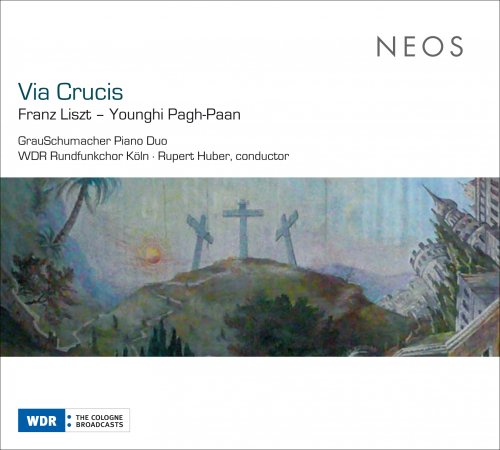
GrauSchumacher Piano Duo, WDR Rundfunkchor Köln, Rupert Huber - Liszt: Via Crucis (2009)
BAND/ARTIST: GrauSchumacher Piano Duo, WDR Rundfunkchor Köln, Rupert Huber
- Title: Liszt: Via Crucis
- Year Of Release: 2009
- Label: Neos
- Genre: Classical
- Quality: FLAC (tracks)
- Total Time: 01:03:02
- Total Size: 218 Mb
- WebSite: Album Preview
Tracklist:
Via Crucis, S53/R534 (version for solo voices, chorus and piano 4 hands) (Franz Liszt)
01. Einleitung [Vexilla regis prodeunt] - 00:04:35
02. Station I. Jesus wird zum Tode verdammt - 00:01:37
03. Station II. Jesus trägt sein Kreuz - 00:02:29
04. Station III. Jesus fällt zum ersten Mal - 00:01:40
05. Station IV. Jesus begegnet seiner heiligen Mutter - 00:03:00
06. Station V. Simon von Kyrene hilft Jesus das Kreuz tragen - 00:03:26
07. Station VI. Sancta Veronica - 00:04:01
08. Station VII. Jesus fällt zum zweiten Mal - 00:01:35
09. Station VIII. Die Frauen von Jerusalem - 00:02:52
10. Station IX. Jesus fällt zum dritten Mal - 00:01:40
11. Station X. Jesus wird entkleidet - 00:02:46
12. Station XI. Jesus wird ans Kreuz geschlagen - 00:01:00
13. Station XII. Jesus stirbt am Kreuze - 00:08:08
14. Station XIII. Jesus wird vom Kreuz genommen - 00:04:56
15. Station XIV. Jesus wird ins Grab gelegt - 00:05:17
Vide Domine, vide afflictionem nostram (Younghi Pagh-paan)
16. Vide Domine, vide afflictionem nostram - 00:14:00
Performers:
GrauSchumacher Piano Duo
WDR Rundfunkchor Köln
Rupert Huber
Via Crucis, S53/R534 (version for solo voices, chorus and piano 4 hands) (Franz Liszt)
01. Einleitung [Vexilla regis prodeunt] - 00:04:35
02. Station I. Jesus wird zum Tode verdammt - 00:01:37
03. Station II. Jesus trägt sein Kreuz - 00:02:29
04. Station III. Jesus fällt zum ersten Mal - 00:01:40
05. Station IV. Jesus begegnet seiner heiligen Mutter - 00:03:00
06. Station V. Simon von Kyrene hilft Jesus das Kreuz tragen - 00:03:26
07. Station VI. Sancta Veronica - 00:04:01
08. Station VII. Jesus fällt zum zweiten Mal - 00:01:35
09. Station VIII. Die Frauen von Jerusalem - 00:02:52
10. Station IX. Jesus fällt zum dritten Mal - 00:01:40
11. Station X. Jesus wird entkleidet - 00:02:46
12. Station XI. Jesus wird ans Kreuz geschlagen - 00:01:00
13. Station XII. Jesus stirbt am Kreuze - 00:08:08
14. Station XIII. Jesus wird vom Kreuz genommen - 00:04:56
15. Station XIV. Jesus wird ins Grab gelegt - 00:05:17
Vide Domine, vide afflictionem nostram (Younghi Pagh-paan)
16. Vide Domine, vide afflictionem nostram - 00:14:00
Performers:
GrauSchumacher Piano Duo
WDR Rundfunkchor Köln
Rupert Huber
Franz Liszt's Via Crucis (Stations of the Cross), composed in 1878, dates from the end of his career, when the formerly flamboyant composer joined a monastic order and spent part of his time living a spartan life in a small apartment near Rome. The work combines extreme spareness with the chromatic experimentation characteristic of the composer's late years, with simple melodies subjected Bachian part-writing that veers into expressive chromatic depths. The work shows off the powers of a small choir and has been recorded many times, but this German release, featuring the West German Radio Chorus of Cologne under Rupert Huber, is a standout for several reasons. First is the uncommon deployment of a piano duo instead of an organ on the keyboard part, which highlights the work's stark contrasts between voice and instrument and sets off the close, minimal text-setting that puts the work in a long tradition running all the way back to Schütz's Passions. Second is superior engineering, putting the listener in among the spaces of the moderately small choir. And finally (and especially flattered by the engineering) is the presence of an unusual complementary work, Vide Domine, vide afflictionem nostram (2007), by contemporary Korean composer Younghi Pagh-Paan. This work, setting Latin texts from letters written by nineteenth century Korean priest Yang-Eop Choe, features close a cappella writing that both lets the choir finish with a technical flourish and amplifies the inward quality of the Liszt. The work was commissioned by the West German Radio Network (WDR), and it's an inspired choice. Few examples of contemporary Korean music are available in the West, and fewer still, in contrast to the Japanese repertory, have been taken up by Western performing organizations. Strongly recommended.
As a ISRA.CLOUD's PREMIUM member you will have the following benefits:
- Unlimited high speed downloads
- Download directly without waiting time
- Unlimited parallel downloads
- Support for download accelerators
- No advertising
- Resume broken downloads


